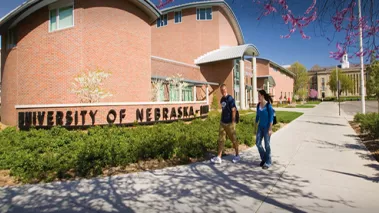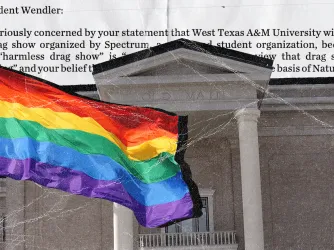Table of Contents
FIRE asks University of Nebraska-Lincoln to reinstate graduate student

This past Friday, FIRE wrote a letter to the University of Nebraska-Lincoln, asking UNL to allow a graduate student, Courtney Lawton, to resume teaching duties after her teaching duties were terminated following a campus protest.
Members of the UNL chapter of Turning Point USA were recruiting for their group outside of the so-called “free speech zone” and were approached by a UNL employee who threatened to call police on the group unless they moved to the free speech zone. The employee also said that students were not allowed to hand out “propaganda.” UNL officials later clarified that UNL does not maintain an official “free speech zone.”
After a few hours of tabling, counterprotesters amassed near the TPUSA chapter’s recruitment event. One of those counterprotesters was Courtney Lawton, a graduate student in UNL’s English Department. Video of the interactions between the counterprotesters and TPUSA students emerged in which Lawton can be seen calling a member of the TPUSA student chapter a “neo-fascist” and alleging the student intended to “destroy public schools, public universities,” and “hates DACA kids.” Lawton showed her middle finger while holding a sign that read “Just say No! to Neo-Fascism.” Lawton also called a TPUSA student a “Becky,” a word some view as a derogatory name for white women. After video of the encounter was made public, UNL removed Lawton from her teaching position and reassigned her to a non-teaching role.
UNL justified relieving Lawton from her teaching duties in a statement:
Our expectations for civility were not met by the lecturer in her behavior toward a student, and not representative of a university where the robust free exchange of ideas takes place 24 hours a day, seven days a week.
However, Lawton says she was told that she was reassigned to non-teaching duties for safety reasons. According to the Lincoln Journal Star, Lawton said:
Executive Vice Chancellor Donde Plowman told me I was being removed from the classroom due to a security threat to me and to my students after Turning Point USA publicized the protest and released a troll storm upon the university.
The same report quoted Lawton saying that the university “received many hostile emails and threats” following the release of the video.
The incident also drew criticism from Nebraska legislators. As my colleague Adam Steinbaugh wrote in FIRE’s letter to UNL:
Sen. Tom Brewer emailed the president of the University of Nebraska, remarking that “[t]his event is being watched very closely by the Unicameral” and forwarding an email from Sen. Laura Ebke. Sen. Ebke, a member of the Nebraska legislature’s Education Committee, shared that she was “concerned about University employees/instructors being actively engaged in counter-protests against University students on campus,” which she felt “violates some ethical codes of conduct.” In an op-ed published in the Scottsbluff Star-Herald, state Sen. Steve Erdman, another member of the legislature’s Education Committee, complained that the demonstration against the TPUSA tabling was “pre-meditated,” that the student had been “verbally assaulted” and labeled a “neo-fascist,” and said that he “expect[ed UNL] to terminate the employment” of the demonstrators “immediately.” An October 30 op-ed published in the Hastings Tribune by three state legislators queried whether professors at UNL were “hostile toward conservative students,” again characterizing speech as “verbally assaulting” the TPUSA organizer.
Legislators should certainly be concerned about ensuring that the campus community is a place where students are free from discriminatory harassment, regardless of their viewpoints. But legislators should also consider that students, including graduate students, enjoy full First Amendment protections at public universities. Lawton’s speech, including displaying her middle finger and using an allegedly derogatory term, is expressive conduct protected by the First Amendment. While the TPUSA students certainly had the right to recruit at UNL (and should not have been restricted to a free speech zone or threatened with a potential call to the police if they did not relocate), counter-protesters also enjoy First Amendment protections while protesting in the open, outdoor areas of a public institution.
While many might be concerned about Lawton’s actions during the counter-protest, Adam pointed out in the letter that allowing universities to punish such expression gives administrators broad authority to censor others in the future:
Certainly, a university can call upon its constituents, faculty and students alike, to conduct themselves in a professional and courteous manner when they debate and argue over their political views. However, penalizing students or faculty for falling short of this laudable goal grants administrators unfettered discretion to censor speech that offends others, or offends administrators, legislators, or distant internet commentators. The chilling effect that accompanies vague standards puts at risk political speech of all perspectives, even if many might view a particular instance of expression as unbecoming.
FIRE is aware that many legislators across the country are confronted with examples of speech that they, or in fact many, might find disagreeable or distasteful. We also greatly appreciate that the lawmakers who weighed in on this case are thinking about ways to protect free speech on campus, and we are confident that they share that common goal in good faith. At the same time, we are concerned that legislative interference with the day-to-day operations of the universities can threaten institutional autonomy and academic freedom. And because Lawton’s speech here was in fact protected, we fear legislative engagement on her employment is counterproductive.
That said, lawmakers can make a real difference in protecting the free speech rights for students at public institutions in their states. We are hopeful that our joint interest in promoting free speech on campus will result in real advances for the free speech rights of students and faculty at institutions across Nebraska. As always, FIRE is happy to offer our assistance to any legislator interested in pursuing such protections.
UNL claims to value the First Amendment, but removing Courtney Lawton from her teaching role runs contrary to the values of free expression. In our letter to UNL, we asked the institution to reinstate Lawton’s teaching responsibilities. FIRE hopes that UNL will reverse course and allow Lawton to resume her teaching duties promptly.
Recent Articles
Get the latest free speech news and analysis from FIRE.

The findings against Harvard are a blueprint for a National Campus Speech Code

VICTORY! 5th Circuit blocks West Texas A&M’s unconstitutional drag ban

Wide-ranging coalition of 'friends of the court' continue to support citizen journalist Priscilla Villarreal in her return to the Supreme Court
